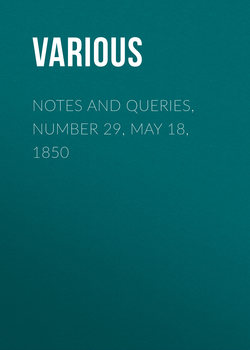Читать книгу Notes and Queries, Number 29, May 18, 1850 - Various - Страница 3
PROVINCIAL WORDS
ОглавлениеIn Twelfth Night, Act ii. Scene 3., occur the words "Sneck up," in C. Knight's edition, or "Snick up," Mr. Collier's edition. These words appear most unaccountably to have puzzled the commentators. Sir Toby Belch uses them in reply to Malvolio, as,—
Enter MALVOLIO
"Mal. My masters, are you mad? or what are you? Have you no wit, manners, nor honesty, but to gabble like tinkers at this time of night? Do you make an alehouse of my lady's house, that you squeak out your cozier's catches without any mitigation or remorse of voice? Is there no respect of place, person, nor time, in you?
"Sir To. We did keep time, Sir, in our catches. Sneck up!"
"Sneck up," according to Mr. C. Knight, is explained thus:—
"A passage in Taylor, the Water Poet, would show that this means 'hang yourself.' A verse from his 'Praise of Hempseed' is given in illustration."
"Snick up," according to Mr. Collier, is said to be "a term of contempt," of which the precise meaning seems to have been lost. Various illustrations are given, as see his Note; but all are wide of the meaning.
Turn to Halliwell's Dictionary of Archaic and Provincial Words, 2d edition, and there is this explanation:—
"SNECK, that part of the iron fastening of a door which is raised by moving the latch. To sneck a door, is to latch it."
See also Burn's Poems: The Vision, Duan First, 7th verse, which is as follows:—
"When dick! the string the snick did draw,—
And jee! the door gaed to the wa';
An' by my ingle-lowe I saw,
Now bliezin' bright,
A tight, outlandish Hizzie, braw,
Come full in sight."
These quotations will clearly show that "sneck" or "snick" applies to a door; and that to sneck a door is to shut it. I think, therefore, that Sir Toby meant to say in the following reply:—
"We did keep time, Sir, in our catches. Sneck up!"
That is, close up, shut up, or, as is said now, "bung up,"—emphatically, "We kept true time;" and the probability is, that in saying this, Sir Toby would accompany the words with the action of pushing an imaginary door; or sneck up.
In the country parts of Lancashire, and indeed throughout the North of England, and it appears Scotland also, the term "sneck the door" is used indiscriminately with "shut the door" or "toin't dur." And there can be little doubt but that this provincialism was known to Shakspeare, as his works are full of such; many of which have either been passed over by his commentators, or have been wrongly noted, as the one now under consideration.
Shakspeare was essentially a man of the people; his learning was from within, not from colleges or schools, but from the universe and himself. He wrote the language of the people; that is, the common every-day language of his time: and hence mere classical scholars have more than once mistaken him, and most egregiously misinterpreted him, as I propose to show in some future Notes.
R.R.
